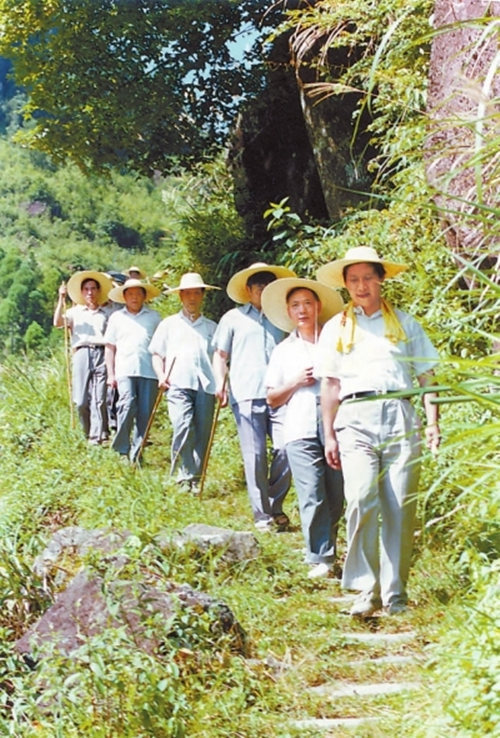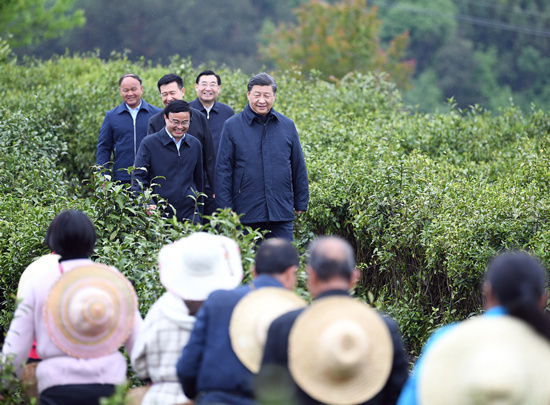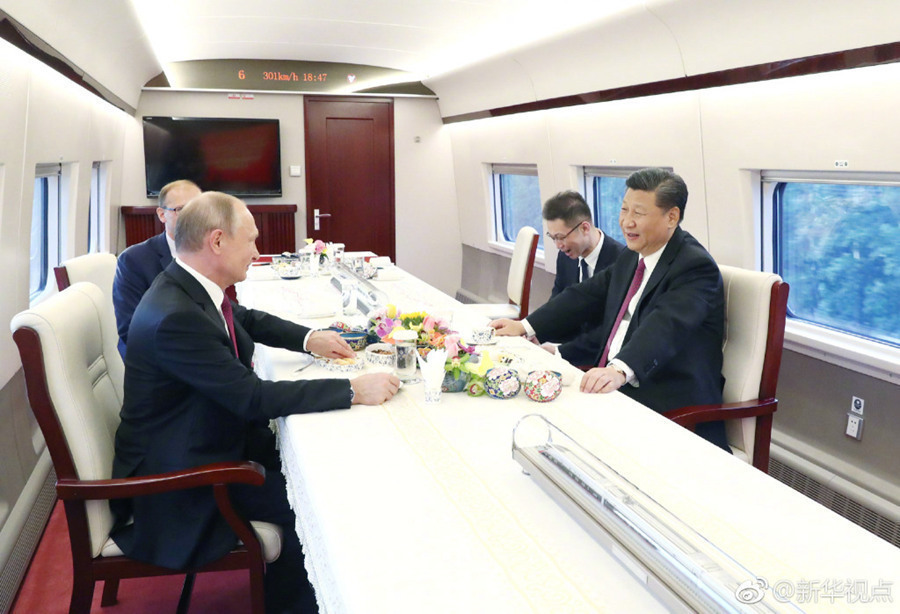“As a major producer and consumer of tea, China is willing to work with all sides to nurture the sustained and healthy development of the global tea industry, deepen cultural exchanges on tea, and allow more people to relish lives accompanied by tea,” said President Xi Jinping on May 21, the first International Tea day.
China has the world’s longest history of tea drinking. For thousands of years, the country has developed a rich culture around tea ceremonies and consumption.
Tea has been part of Xi’s inspection tours and diplomatic activities: visiting tea farms, encouraging tea industry development, and having tea with foreign leaders.
Let’s follow Xi and learn about the long-lasting charm of tea.
People-oriented concept
During his term as a deputy mayor of Xiamen, East China’s Fujian Province, Xi often visited rural areas.

The file photo shows Xi Jinping (1st R), the then party chief of Ningde in Fujian Province, walking with local officials en route to a village in the mountainous Shouning county for an inspection in July 1989.
Once during a visit to a village, the village head served him a cup of tea. Though the cup looked a bit dirty with thick stains due to being used for a long time, Xi didn’t mind and drank it without any hesitation.
An official who accompanied Xi recalls that “in the past, the officials often drank water with their own thermos when visiting rural families. Unlike them, Xi’s deeds greatly brought the local people much closer to him.”
Since the 18th National Congress of the CPC, Xi has gone to villages, communities, schools and factories, talking with grass-roots workers and inquiring about their livelihoods.
Xi said officials should go more to places with harsh conditions and help the locals solve problems, maintain close ties with the people, work together with them and share weal and woe through thick and thin.
Poverty alleviation
Xi loves tea, and he is also focused on the development of tea industry.
In 2003, when Xi worked as the Party chief of East China’s Zhejiang Province, he visited Huangdu village of Anji county in Zhejiang. After learning that the development of the white tea industry greatly helped increase the income of the locals, Xi said, “A leaf helps residents in whole region get rich.”
Even now, Xi’s words are still carved on a big stone at the white tea plantation base, serving as an impetus for the villagers to constantly develop the tea industry.
In 2018, 20 farmers from Huangdu village jointly wrote a letter to Xi, explaining their progress with the tea industry and proposing to donate 15 million tea saplings to poverty-stricken areas.
“When drinking water, one should never forget those who dug the well. After becoming rich, we have never forgotten the kindness and love of the Party," the farmers said in the letter.
In the letter of reply, Xi highly praised their spirit, saying that it's of great significance that those who have already become well-off help those who are still living in poverty.

Chinese President Xi Jinping visits a tea farm in Pingli County, Northwest China's Shaanxi province, April 21, 2020. (Photo: Xinhua)
In April, Xi visited a tea farm in Pingli County in Northwest China’s Shaanxi Province, where people managed to shake off poverty by investing in the tea industry.
During an inspection tour in Yingxiu, Southwest China’s Sichuan Province, in February 2018, he visited a tea-making workshop and helped brew buttered tea.
Xi has also stressed striving for excellence and building brands in the tea industry.
International relations
Tea is a symbol of Chinese civilization. Xi having tea with visiting foreign leaders is commonly seen in reports and pictures.
On diplomatic occasions, he occasionally uses tea as a metaphor for harmony between man and nature, or a metaphor for diplomatic relations.

President Xi Jinping and Russian President Vladimir Putin are on a high-speed train bound for Tianjin on June 8, 2018. (Photo: Xinhua)
In the Great Hall of the People in Beijing in 2017, Xi talked with Vietnamese leader Nguyen Phu Trong about traditional Chinese tea culture. Xi related to the concept of harmony in Chinese culture by analyzing the Chinese character of “tea(茶)”, which is formed with Chinese character people (人)between grass (艹) and trees (木).
In July 2014 when delivering a speech at the National Congress of Brazil during his state visit to the Latin American country, he mentioned the Chinese tea farmers who traveled to Brazil some 200 years ago to teach local people about tea planting techniques, as an example of longtime bilateral friendly exchanges.
When speaking at the College of Europe in Belgium in April 2014, he used the comparison of tea and beer to talk about China-Europe relations.
Xi said Chinese people are fond of tea and the Belgians love beer, which represent two ways of understanding life and knowing the world. He added that the two ways do not contradict each other and both embody the idea of “harmony in diversity.”
(Compiled by Huang Jingjing, Ma Wenqian and Zhang Yuanzheng)


